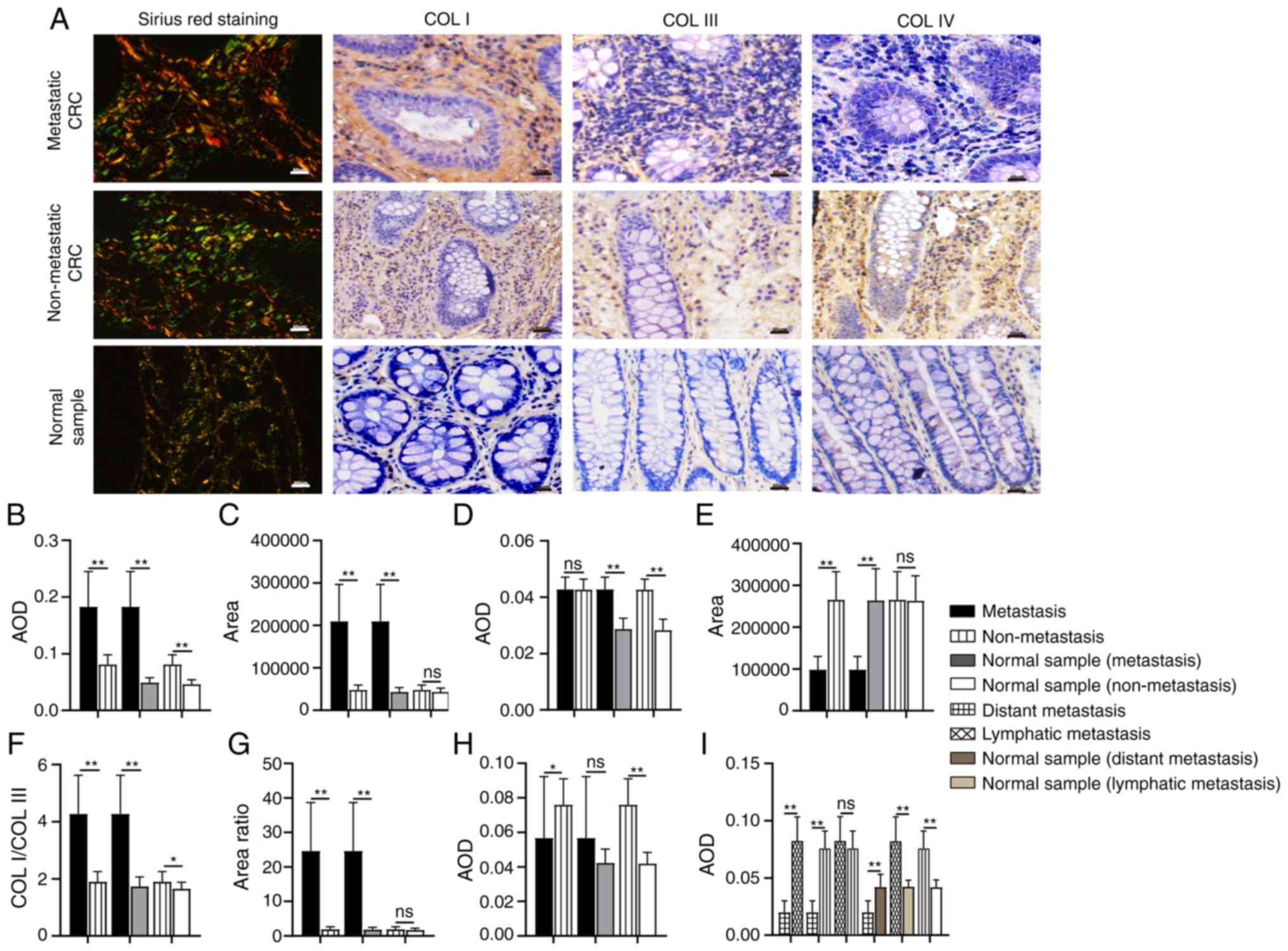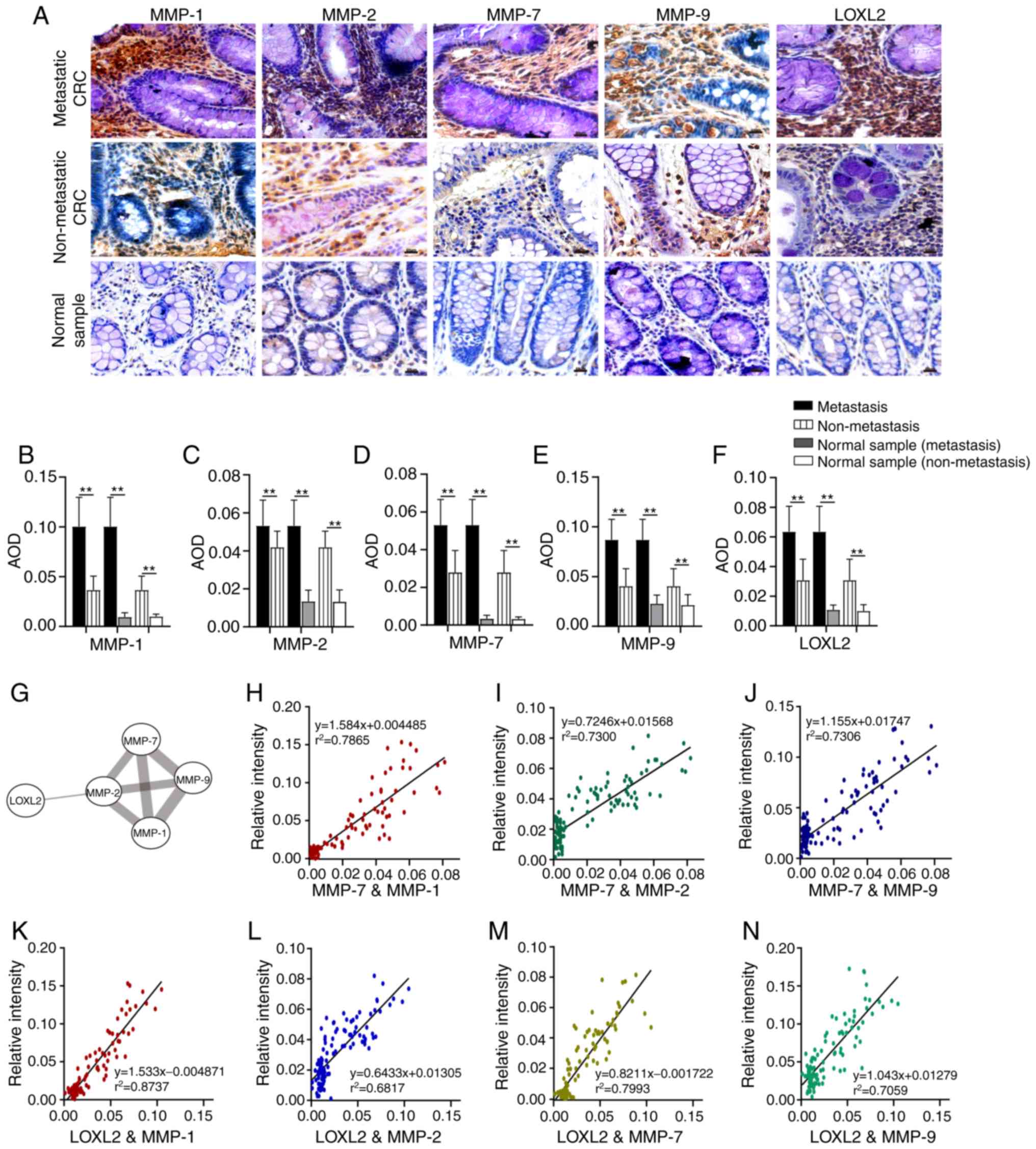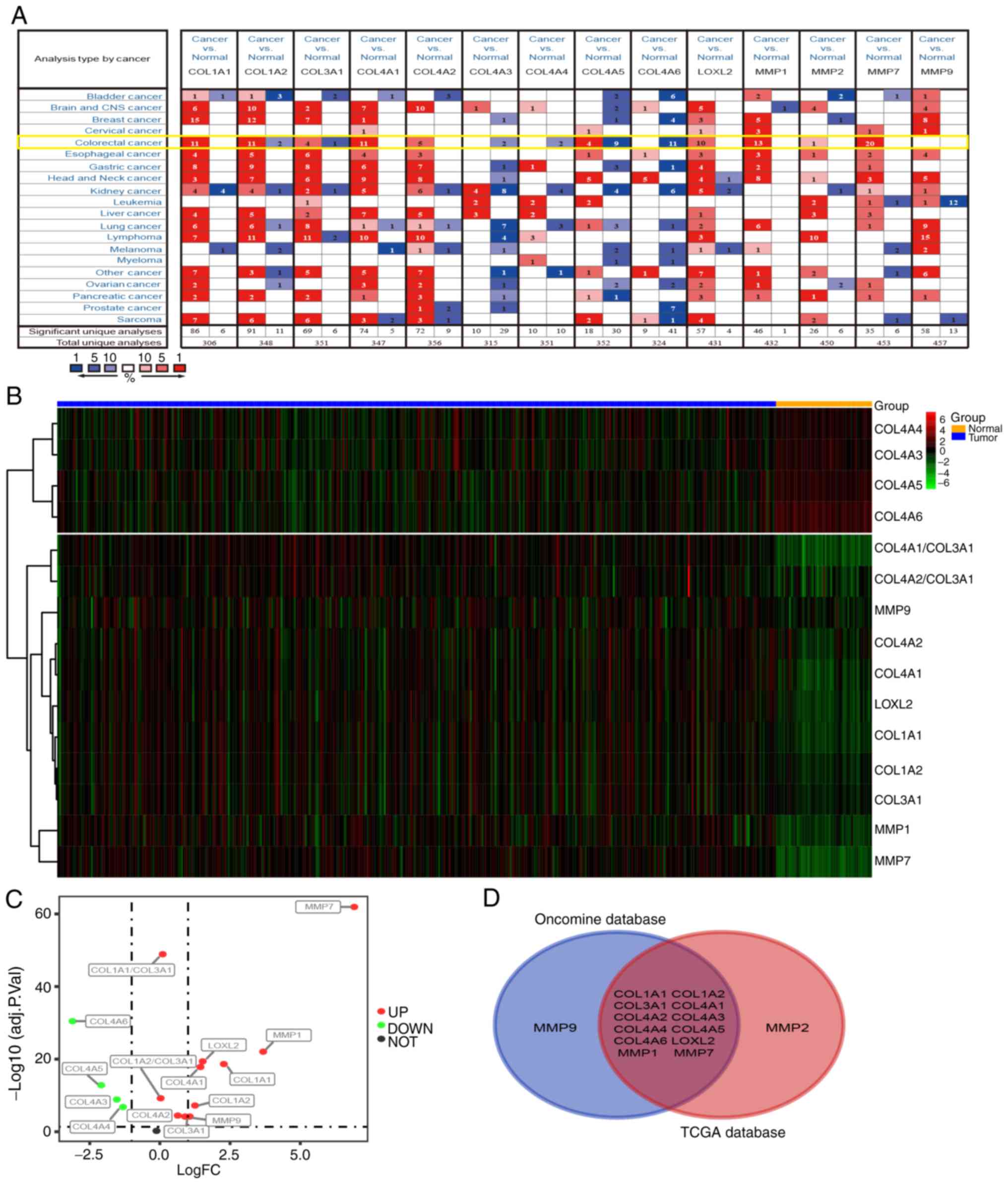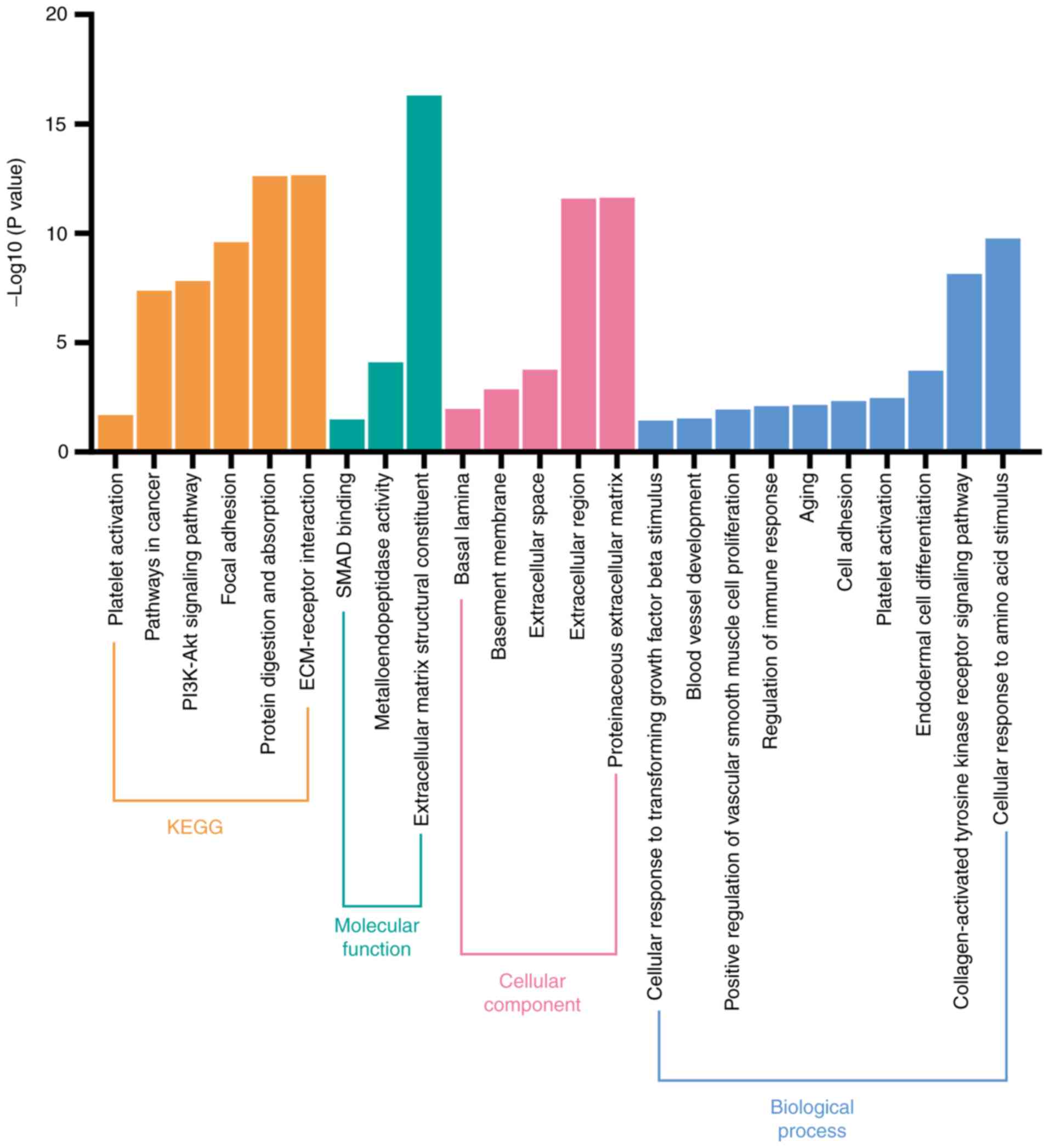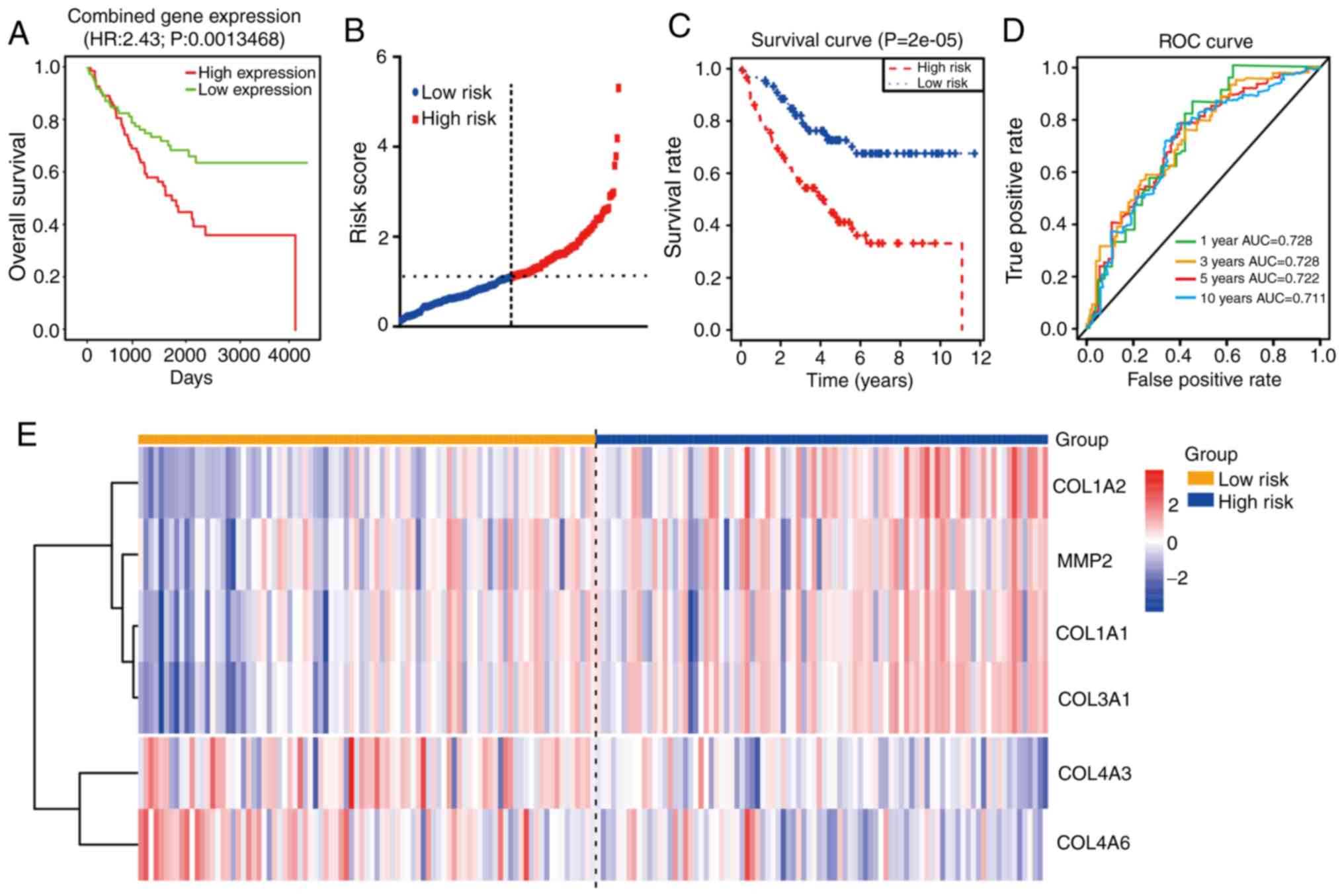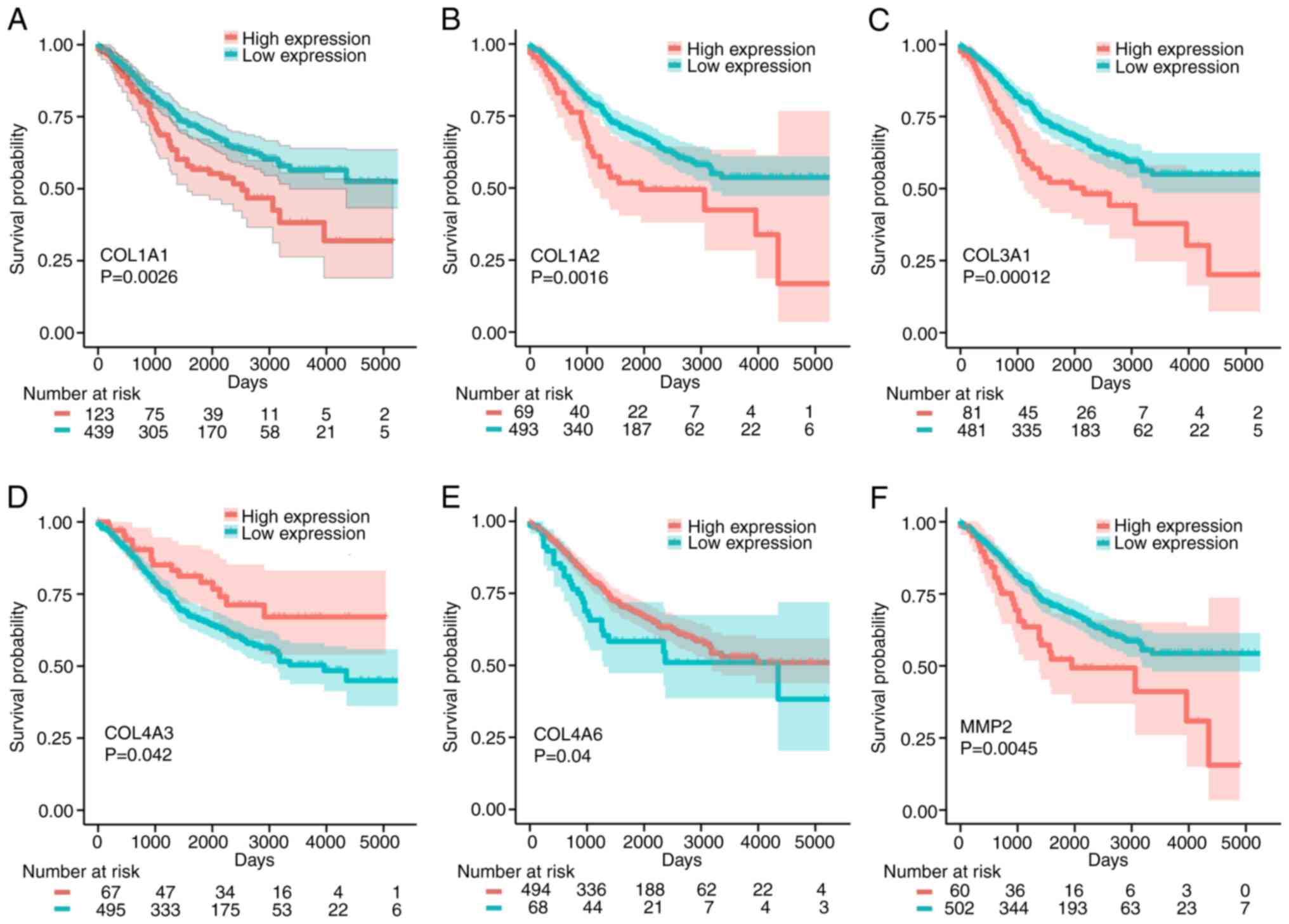|
1
|
Bray F, Ferlay J, Soerjomataram I, Siegel
RL, Torre LA and Jemal A: Global cancer statistics 2018: GLOBOCAN
estimates of incidence and mortality worldwide for 36 cancers in
185 countries. CA Cancer J Clin. 68:394–424. 2018. View Article : Google Scholar : PubMed/NCBI
|
|
2
|
Turajlic S and Swanton C: Metastasis as an
evolutionary process. Science. 352:169–175. 2016. View Article : Google Scholar : PubMed/NCBI
|
|
3
|
Crotti S, Piccoli M, Rizzolio F, Giordano
A, Nitti D and Agostini M: Extracellular matrix and colorectal
cancer: How surrounding microenvironment affects cancer cell
behavior? J Cell Physiol. 232:967–975. 2017. View Article : Google Scholar : PubMed/NCBI
|
|
4
|
Provenzano PP, Eliceiri KW, Campbell JM,
Inman DR, White JG and Keely PJ: Collagen reorganization at the
tumor-stromal interface facilitates local invasion. BMC Med.
4:382006. View Article : Google Scholar : PubMed/NCBI
|
|
5
|
Chen D, Chen G, Jiang W, Fu M, Liu W, Sui
J, Xu S, Liu Z, Zheng X, Chi L, et al: Association of the collagen
signature in the tumor microenvironment with lymph node metastasis
in early gastric cancer. JAMA Surg. 154:e1852492019. View Article : Google Scholar : PubMed/NCBI
|
|
6
|
Huynh RN, Yousof M, Ly KL, Gombedza FC,
Luo X, Bandyopadhyay BC and Raub CB: Microstructural densification
and alignment by aspiration-ejection influence cancer cell
interactions with three-dimensional collagen networks. Biotechnol
Bioeng. 117:1826–1838. 2020. View Article : Google Scholar : PubMed/NCBI
|
|
7
|
Conklin MW and Keely PJ: Why the stroma
matters in breast cancer: Insights into breast cancer patient
outcomes through the examination of stromal biomarkers. Cell Adh
Migr. 6:249–260. 2012. View Article : Google Scholar : PubMed/NCBI
|
|
8
|
Whatcott CJ, Diep CH, Jiang P, Watanabe A,
LoBello J, Sima C, Hostetter G, Shepard HM, Von Hoff DD and Han H:
Desmoplasia in primary tumors and metastatic lesions of pancreatic
cancer. Clin Cancer Res. 21:3561–3568. 2015. View Article : Google Scholar : PubMed/NCBI
|
|
9
|
Bonnans C, Chou J and Werb Z: Remodelling
the extracellular matrix in development and disease. Nat Rev Mol
Cell Biol. 15:786–801. 2014. View Article : Google Scholar : PubMed/NCBI
|
|
10
|
Beam J, Botta A, Ye J, Soliman H, Matier
BJ, Forrest M, MacLeod KM and Ghosh S: Excess linoleic acid
increases collagen I/III ratio and ‘stiffens’ the heart muscle
following high fat diets. J Biol Chem. 290:23371–23384. 2015.
View Article : Google Scholar : PubMed/NCBI
|
|
11
|
Najafi M, Farhood B and Mortezaee K:
Extracellular matrix (ECM) stiffness and degradation as cancer
drivers. J Cell Biochem. 120:2782–2790. 2019. View Article : Google Scholar : PubMed/NCBI
|
|
12
|
Brauchle E, Kasper J, Daum R, Schierbaum
N, Falch C, Kirschniak A, Schäffer TE and Schenke-Layland K:
Biomechanical and biomolecular characterization of extracellular
matrix structures in human colon carcinomas. Matrix Biol.
68-69:180–193. 2018. View Article : Google Scholar : PubMed/NCBI
|
|
13
|
Paul CD, Hruska A, Staunton JR, Burr HA,
Daly KM, Kim J, Jiang N and Tanner K: Probing cellular response to
topography in three dimensions. Biomaterials. 197:101–118. 2019.
View Article : Google Scholar : PubMed/NCBI
|
|
14
|
Tanjore H and Kalluri R: The role of type
IV collagen and basement membranes in cancer progression and
metastasis. Am J Pathol. 168:715–717. 2006. View Article : Google Scholar : PubMed/NCBI
|
|
15
|
Hua H, Li M, Luo T, Yin Y and Jiang Y:
Matrix metalloproteinases in tumorigenesis: An evolving paradigm.
Cell Mol Life Sci. 68:3853–3868. 2011. View Article : Google Scholar : PubMed/NCBI
|
|
16
|
Tjin G, White ES, Faiz A, Sicard D,
Tschumperlin DJ, Mahar A, Kable EPW and Burgess JK: Lysyl oxidases
regulate fibrillar collagen remodelling in idiopathic pulmonary
fibrosis. Dis Model Mech. 10:1301–1312. 2017. View Article : Google Scholar : PubMed/NCBI
|
|
17
|
Wong CC, Tse AP, Huang YP, Zhu YT, Chiu
DK, Lai RK, Au SL, Kai AK, Lee JM, Wei LL, et al: Lysyl
oxidase-like 2 is critical to tumor microenvironment and metastatic
niche formation in hepatocellular carcinoma. Hepatology.
60:1645–1658. 2014. View Article : Google Scholar : PubMed/NCBI
|
|
18
|
Shiozawa J, Ito M, Nakayama T, Nakashima
M, Kohno S and Sekine I: Expression of matrix metalloproteinase-1
in human colorectal carcinoma. Mod Pathol. 13:925–933. 2000.
View Article : Google Scholar : PubMed/NCBI
|
|
19
|
Moreno-Bueno G, Salvador F, Martín A,
Floristán A, Cuevas EP, Santos V, Montes A, Morales S, Castilla MA,
Rojo-Sebastián A, et al: Lysyl oxidase-like 2 (LOXL2), a new
regulator of cell polarity required for metastatic dissemination of
basal-like breast carcinomas. EMBO Mol Med. 3:528–544. 2011.
View Article : Google Scholar : PubMed/NCBI
|
|
20
|
Liu Y, Zhang J, Chen Y, Sohel H, Ke X,
Chen J and Li YX: The correlation and role analysis of COL4A1 and
COL4A2 in hepatocarcinogenesis. Aging (Albany NY). 12:204–223.
2020. View Article : Google Scholar : PubMed/NCBI
|
|
21
|
Zhao S and Yu M: Identification of MMP1 as
a potential prognostic biomarker and correlating with immune
infiltrates in cervical squamous cell carcinoma. DNA Cell Biol.
39:255–272. 2020. View Article : Google Scholar : PubMed/NCBI
|
|
22
|
Sugai T, Yamada N, Eizuka M, Sugimoto R,
Uesugi N, Osakabe M, Ishida K, Otsuka K, Sasaki A and Matsumoto T:
Vascular invasion and stromal S100A4 expression at the invasive
front of colorectal cancer are novel determinants and tumor
prognostic markers. J Cancer. 8:1552–1561. 2017. View Article : Google Scholar : PubMed/NCBI
|
|
23
|
Xiaopei H, Kunfu D, Lianyuan T, Zhen L,
Mei X and Haibo Y: Tumor invasion front morphology: A novel
prognostic factor for intrahepatic cholangiocarcinoma. Eur Rev Med
Pharmacol Sci. 23:9821–9828. 2019.PubMed/NCBI
|
|
24
|
Brierley J, Gospodarowicz M and Wittekind
C: International Union Against Cancer: TNM Classification of
Malignant Tumours. 8th. Wiley-Blackwell; West Sussex, United
Kingdom: 2017
|
|
25
|
Coelho PGB, Souza MV, Conceição LG,
Viloria MIV and Bedoya SAO: Evaluation of dermal collagen stained
with picrosirius red and examined under polarized light microscopy.
An Bras Dermatol. 93:415–418. 2018. View Article : Google Scholar : PubMed/NCBI
|
|
26
|
Szklarczyk D, Gable AL, Lyon D, Junge A,
Wyder S, Huerta-Cepas J, Simonovic M, Doncheva NT, Morris JH, Bork
P, et al: STRING v11: Protein-protein association networks with
increased coverage, supporting functional discovery in genome-wide
experimental datasets. Nucleic Acids Res. 47:D607–D613. 2019.
View Article : Google Scholar : PubMed/NCBI
|
|
27
|
Cline MS, Craft B, Swatloski T, Goldman M,
Ma S, Haussler D and Zhu J: Exploring TCGA Pan-Cancer data at the
UCSC cancer genomics browser. Sci Rep. 3:26522013. View Article : Google Scholar : PubMed/NCBI
|
|
28
|
Huang da W, Sherman BT and Lempicki RA:
Systematic and integrative analysis of large gene lists using DAVID
bioinformatics resources. Nat Protoc. 4:44–57. 2009. View Article : Google Scholar : PubMed/NCBI
|
|
29
|
Smith JJ, Deane NG, Wu F, Merchant NB,
Zhang B, Jiang A, Lu P, Johnson JC, Schmidt C, Bailey CE, et al:
Experimentally derived metastasis gene expression profile predicts
recurrence and death in patients with colon cancer.
Gastroenterology. 138:958–968. 2010. View Article : Google Scholar : PubMed/NCBI
|
|
30
|
Mizukami A, Matsue Y, Naruse Y, Kowase S,
Kurosaki K, Suzuki M, Matsumura A, Nogami A, Aonuma K and Hashimoto
Y: Kaplan-Meier survival analysis and Cox regression analyses
regarding right ventricular septal pacing: Data from Japanese
pacemaker cohort. Data Brief. 8:1303–1307. 2016. View Article : Google Scholar : PubMed/NCBI
|
|
31
|
Goswami CP and Nakshatri H: PROGgeneV2:
Enhancements on the existing database. BMC Cancer. 14:9702014.
View Article : Google Scholar : PubMed/NCBI
|
|
32
|
Marisa L, de Reyniès A, Duval A, Selves J,
Gaub MP, Vescovo L, Etienne-Grimaldi MC, Schiappa R, Guenot D,
Ayadi M, et al: Gene expression classification of colon cancer into
molecular subtypes: Characterization, validation, and prognostic
value. PLoS Med. 10:e10014532013. View Article : Google Scholar : PubMed/NCBI
|
|
33
|
Ritchie ME, Phipson B, Wu D, Hu Y, Law CW,
Shi W and Smyth GK: Limma powers differential expression analyses
for RNA-sequencing and microarray studies. Nucleic Acids Res.
43:e472015. View Article : Google Scholar : PubMed/NCBI
|
|
34
|
Junqueira LC, Cossermelli W and Brentani
R: Differential staining of collagens type I, II and III by Sirius
Red and polarization microscopy. Arch Histol Jpn. 41:267–274. 1978.
View Article : Google Scholar : PubMed/NCBI
|
|
35
|
Kalluri R: Basement membranes: Structure,
assembly and role in tumour angiogenesis. Nat Rev Cancer.
3:422–433. 2003. View Article : Google Scholar : PubMed/NCBI
|
|
36
|
Deryugina EI and Quigley JP: Matrix
metalloproteinases and tumor metastasis. Cancer Metastasis Rev.
25:9–34. 2006. View Article : Google Scholar : PubMed/NCBI
|
|
37
|
Hsu TI, Lin SC, Lu PS, Chang WC, Hung CY,
Yeh YM, Su WC, Liao PC and Hung JJ: MMP7-mediated cleavage of
nucleolin at Asp255 induces MMP9 expression to promote tumor
malignancy. Oncogene. 36:875–876. 2017. View Article : Google Scholar : PubMed/NCBI
|
|
38
|
Zhou D, Tian Y, Sun L, Zhou L, Xiao L, Tan
RJ, Tian J, Fu H, Hou FF and Liu Y: Matrix metalloproteinase-7 is a
urinary biomarker and pathogenic mediator of kidney fibrosis. J Am
Soc Nephrol. 28:598–611. 2017. View Article : Google Scholar : PubMed/NCBI
|
|
39
|
Imai K, Yokohama Y, Nakanishi I, Ohuchi E,
Fujii Y, Nakai N and Okada Y: Matrix metalloproteinase 7
(matrilysin) from human rectal carcinoma cells activation of the
precursor, interaction with other matrix metalloproteinases and
enzymic properties. J Biol Chem. 270:6691–6697. 1995. View Article : Google Scholar : PubMed/NCBI
|
|
40
|
Kim YM, Kim EC and Kim Y: The human lysyl
oxidase-like 2 protein functions as an amine oxidase toward
collagen and elastin. Mol Biol Rep. 38:145–149. 2011. View Article : Google Scholar : PubMed/NCBI
|
|
41
|
López-Jiménez AJ, Basak T and Vanacore RM:
Proteolytic processing of lysyl oxidase-like-2 in the extracellular
matrix is required for crosslinking of basement membrane collagen
IV. J Biol Chem. 292:16970–16982. 2017. View Article : Google Scholar : PubMed/NCBI
|
|
42
|
Chiang WF, Liu SY, Fang LY, Lin CN, Wu MH,
Chen YC, Chen YL and Jin YT: Overexpression of galectin-1 at the
tumor invasion front is associated with poor prognosis in
early-stage oral squamous cell carcinoma. Oral Oncol. 44:325–334.
2008. View Article : Google Scholar : PubMed/NCBI
|
|
43
|
Zhou ZH, Ji CD, Xiao HL, Zhao HB, Cui YH
and Bian XW: Reorganized collagen in the tumor microenvironment of
gastric cancer and its association with prognosis. J Cancer.
8:1466–1476. 2017. View Article : Google Scholar : PubMed/NCBI
|
|
44
|
Pang MF, Siedlik MJ, Han S, Stallings-Mann
M, Radisky DC and Nelson CM: Tissue stiffness and hypoxia modulate
the integrin-linked kinase ILK to control breast cancer stem-like
cells. Cancer Res. 76:5277–5287. 2016. View Article : Google Scholar : PubMed/NCBI
|
|
45
|
Cackowski FC, Wang Y, Decker JT, Sifuentes
C, Weindorf S, Jung Y, Wang Y, Decker AM, Yumoto K, Szerlip N, et
al: Detection and isolation of disseminated tumor cells in bone
marrow of patients with clinically localized prostate cancer.
Prostate. 79:1715–1727. 2019. View Article : Google Scholar : PubMed/NCBI
|
|
46
|
Ray A, Slama ZM, Morford RK, Madden SA and
Provenzano PP: Enhanced directional migration of cancer stem cells
in 3D aligned collagen matrices. Biophys J. 112:1023–1036. 2017.
View Article : Google Scholar : PubMed/NCBI
|
|
47
|
Tilbury K, Lien CH, Chen SJ and Campagnola
PJ: Differentiation of Col I and Col III isoforms in stromal models
of ovarian cancer by analysis of second harmonic generation
polarization and emission directionality. Biophys J. 106:354–365.
2014. View Article : Google Scholar : PubMed/NCBI
|
|
48
|
Fan HX, Li HX, Chen D, Gao ZX and Zheng
JH: Changes in the expression of MMP2, MMP9, and ColIV in stromal
cells in oral squamous tongue cell carcinoma: Relationships and
prognostic implications. J Exp Clin Cancer Res. 31:902012.
View Article : Google Scholar : PubMed/NCBI
|
|
49
|
Öhlund D, Franklin O, Lundberg E, Lundin C
and Sund M: Type IV collagen stimulates pancreatic cancer cell
proliferation, migration, and inhibits apoptosis through an
autocrine loop. BMC Cancer. 13:1542013. View Article : Google Scholar : PubMed/NCBI
|
|
50
|
Wang J, Boddupalli A, Koelbl J, Nam DH, Ge
X, Bratlie KM and Schneider IC: Degradation and remodeling of
epitaxially grown collagen fibrils. Cell Mol Bioeng. 12:69–84.
2019. View Article : Google Scholar : PubMed/NCBI
|
|
51
|
Barker HE, Chang J, Cox TR, Lang G, Bird
D, Nicolau M, Evans HR, Gartland A and Erler JT: LOXL2-mediated
matrix remodeling in metastasis and mammary gland involution.
Cancer Res. 71:1561–1572. 2011. View Article : Google Scholar : PubMed/NCBI
|
|
52
|
Zhou CX, Gao Y, Johnson NW and Gao J:
Immunoexpression of matrix metalloproteinase-2 and matrix
metalloproteinase-9 in the metastasis of squamous cell carcinoma of
the human tongue. Aust Dent J. 55:385–389. 2010. View Article : Google Scholar : PubMed/NCBI
|
|
53
|
Liu M, Hu Y, Zhang MF, Luo KJ, Xie XY, Wen
J, Fu JH and Yang H: MMP1 promotes tumor growth and metastasis in
esophageal squamous cell carcinoma. Cancer Lett. 377:97–104. 2016.
View Article : Google Scholar : PubMed/NCBI
|
|
54
|
Ma HP, Chang HL, Bamodu OA, Yadav VK,
Huang TY, Wu ATH, Yeh CT, Tsai SH and Lee WH: Collagen 1A1 (COL1A1)
is a reliable biomarker and putative therapeutic target for
hepatocellular carcinogenesis and metastasis. Cancers (Basel).
11:7862019. View Article : Google Scholar
|
|
55
|
Misawa K, Mochizuki D, Imai A, Mima M,
Misawa Y and Mineta H: Analysis of site-specific methylation of
tumor-related genes in head and neck cancer: Potential utility as
biomarkers for prognosis. Cancers (Basel). 10:272018. View Article : Google Scholar
|
|
56
|
Su B, Zhao W, Shi B, Zhang Z, Yu X, Xie F,
Guo Z, Zhang X, Liu J, Shen Q, et al: Let-7d suppresses growth,
metastasis, and tumor macrophage infiltration in renal cell
carcinoma by targeting COL3A1 and CCL7. Mol Cancer. 13:2062014.
View Article : Google Scholar : PubMed/NCBI
|
|
57
|
Wang T, Hou J, Jian S, Luo Q, Wei J, Li Z,
Wang X, Bai P, Duan B, Xing J and Cai J: miR-29b negatively
regulates MMP2 to impact gastric cancer development by suppress
gastric cancer cell migration and tumor growth. J Cancer.
9:3776–3786. 2018. View Article : Google Scholar : PubMed/NCBI
|
|
58
|
Nabais Sá MJ, Storey H, Flinter F, Nagel
M, Sampaio S, Castro R, Araújo JA, Gaspar MA, Soares C, Oliveira A,
et al: Collagen type IV-related nephropathies in Portugal:
Pathogenic COL4A3 and COL4A4 mutations and clinical
characterization of 25 families. Clin Genet. 88:456–461. 2015.
View Article : Google Scholar : PubMed/NCBI
|
|
59
|
Takeuchi M, Yamaguchi S, Yonemura S,
Kakiguchi K, Sato Y, Higashiyama T, Shimizu T and Hibi M: Type IV
collagen controls the axogenesis of cerebellar granule cells by
regulating basement membrane integrity in Zebrafish. PLoS Genet.
11:e10055872015. View Article : Google Scholar : PubMed/NCBI
|
|
60
|
Mammadova-Bach E, Zigrino P, Brucker C,
Bourdon C, Freund M, De Arcangelis A, Abrams SI, Orend G, Gachet C
and Mangin PH: Platelet integrin α6β1 controls lung metastasis
through direct binding to cancer cell-derived ADAM9. JCI Insight.
1:e882452016. View Article : Google Scholar : PubMed/NCBI
|
|
61
|
Lavergne M, Janus-Bell E, Schaff M, Gachet
C and Mangin PH: Platelet integrins in tumor metastasis: Do they
represent a therapeutic target? Cancers (Basel). 9:1332017.
View Article : Google Scholar
|
|
62
|
Repsold L, Pool R, Karodia M, Tintinger G
and Joubert AM: An overview of the role of platelets in
angiogenesis, apoptosis and autophagy in chronic myeloid leukaemia.
Cancer Cell Int. 17:892017. View Article : Google Scholar : PubMed/NCBI
|
|
63
|
Egan K, Cooke N and Kenny D: Living in
shear: Platelets protect cancer cells from shear induced damage.
Clin Exp Metastasis. 31:697–704. 2014. View Article : Google Scholar : PubMed/NCBI
|















